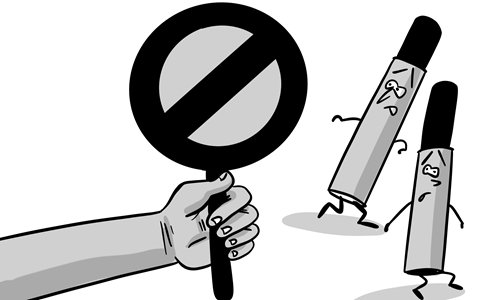HOME >> BUSINESS
Will China follow US, India in regulating e-cigarettes?
By Zhou Zheng Source:Global Times Published: 2019/9/24 20:18:40

Illustration: Luo Xuan/GT
Walmart will reportedly remove e-cigarettes from its shelves due to increasing regulation uncertainty in the US. The US Food and Drug Administration (FDA) and the US Center for Disease Control and Prevention (CDC) are investigating lung illnesses related to vaping. India has recently announced a ban on e-cigarettes. As the world's largest e-cigarette producer, China's e-cigarette industry may take a hit as this regulatory trend looms. Will China follow suit and regulate its e-cigarette industry?China-produced e-cigarettes have taken up over 90 percent of the global market share, most of which were exported overseas through the OEM and the ODM. A well-circulated report has estimated that the total market volume of worldwide e-cigarette sales surpassed $14.5 billion in 2018; another forecasted the number will rise beyond $40 billion in 2023.
E-cigarettes differ from other non-combustible cigarettes as they contain e-liquid rather than tobacco, which produces the harmful chemical tar while burning. Therefore, many vape brands in China have advertised their products as a harmless alternative to tobacco, or have promoted them as helpful to quitting smoking.
However, e-liquid may contain nicotine (typically derived from the tobacco plant), glycerin, propylene glycol, flavorings and other ingredients, according to the FDA website. E-liquid burned by an electronic heating source creates an aerosol that the user inhales. Most substances mentioned above have not yet been put through careful examination.
Many investors in China have rushed into this burgeoning industry, particularly in 2018, without knowing or having proven the impact of e-cigarettes to public health.
A total of seven companies listed on the Chinese A-share market engaged in e-cigarette-related businesses, and their total revenue combined last year reached 21.8 billion yuan ($3.06 billion), the Economic View reported. It is commonly believed that vaporizers have higher profitability than traditional tobacco. With this perception, the industry has attracted various investors, from China Tobacco Yunnan Industrial to Chinese celebrities.
According to incomplete data, over 35 e-cigarette projects were invested in during the first half of this year. The total investment revealed was above 1 billion yuan over the same period.
While e-cigarettes have become a new opportunity for windfall gain in China, regulations are on the way. China has issued a notice prohibiting the sale of vaporizers to people under 18 years of age, citing safety and health risks. The Hong Kong Special Administrative Region government has pushed a blanket ban on e-cigarettes. Though the US FDA and CDC are still working on finding the cause of the lung-disease outbreak, the state of New York took initiative and banned most flavored e-cigarettes last week. India announced a total ban on the sale of vaporizers.
The Chinese e-cigarette market still has some regulation blanks to fill. Since they cannot be categorized as non-combustible cigarettes, which are already under regulation by China Tobacco, the country's tobacco industry administration, e-cigarettes require another set of rules and regulations to follow, or another government agency, like the China Food and Drug Administration, to get involved.
A national standard for e-cigarettes has been in preparation from 2017. Media have recently been reporting that the new standard is likely to roll out in October.
Compared to the West, e-cigarettes have never been hugely popular in China. This is partly due to the taste of the vapor, which more resembles Western tobacco and differs greatly from Chinese cigarettes which are made with flue-cured tobacco.
More importantly, the highly unregulated market has deterred customers. E-cigarette sellers, who were trying to make quick profit, marked the price so high that potential customers avoided the products when they came to the market.
After capital began flooding in, it generated all types of players in the industry - small workshops and online stores are now ubiquitous. Should more regulations be put in place to monitor e-cigarette businesses, the industry will soon face a reshuffle.
Of course, speeding up the e-cigarette standard drafting process is necessary. Meanwhile, more medical studies on the side-effects and impact of vaporizers should be hastily carried out by China.
The author is a reporter with the Global Times. bizopinion@globaltimes.com.cn
Posted in: INSIDER'S EYE